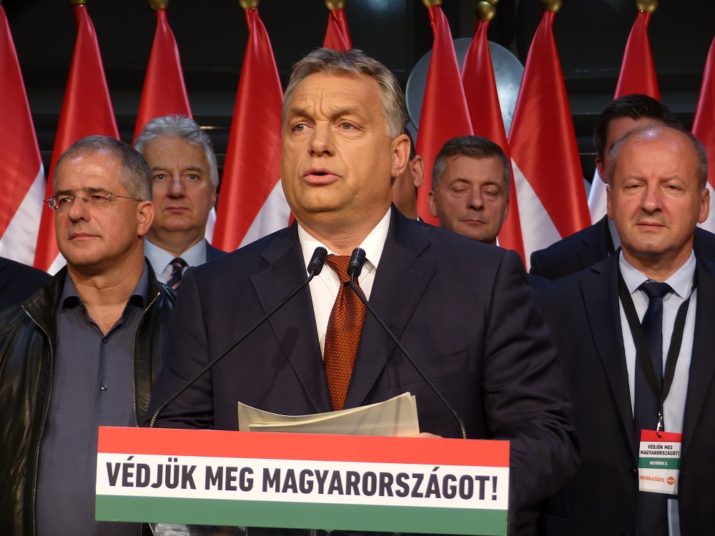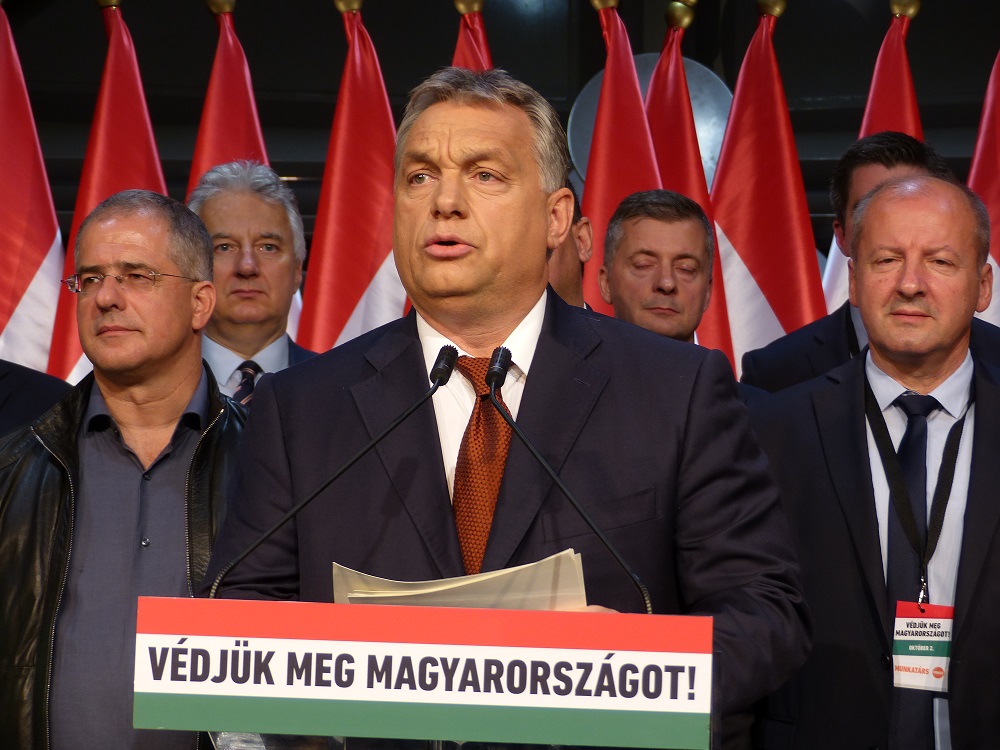
The “In Defense of National Identity” Argument: Comparing the UK and Hungarian Referendums of 2016

This is part of our special feature on Forced Migration, Cultural Identity, and Trauma.
In 2000, the Hungarian academic Laszlo J. Kiss wrote, “By the end of the twentieth century, ‘nationalism’ had become a loaded term, generally associated with xenophobic ethno-nationalism and smacking of genocide and ethno-territorialism.” It is for this reason, he continued, that “there is a tendency to avoid discussing nationalism, national identity and the power of ethnicity in shaping policy” (Kiss 2000). Recent events, however, show us that nationalism and national identity are no longer taboo. The 2016 presidential election in the United States saw the Trump campaign extensively use national identity to frame its arguments on issues including trade, immigration, education, and security, among others. Likewise, in the UK’s June 2016 referendum on whether to remain a member of the European Union, and the October 2016 Hungarian referendum on whether to accept or reject an EU policy on quotas for the resettlement of refugees, the issue of national identity was front and center of public, political, and even judicial debate. These are only some of the growing number of examples of political events where nationalism and national identity have become important defining concepts.
National identity and its cultural, ethnic, and constitutional components are now regularly used to justify and shape policy and political decision-making. For some, this is an acceptable development, evidenced by the increased use in political rhetoric of the “in defense of national identity” argument. For others, it represents a return to the xenophobia and ethno-nationalism that underpinned the horrors of twentieth century Europe, and in doing so further reinforces what they see as an “illiberal turn” driven by the growth of right-wing populism. As such, we are witnessing the emergence of a deep illiberal-liberal cleavage in politics, which in the context of Europe has the potential to create significant challenges for the direction of European integration. This essay presents a brief interpretation of why this is the case.
The UK and Hungarian cases mentioned above are particularly interesting because although they share many similar traits in terms of how the “in defense of national identity” argument informed debate during and after their respective referenda, there are also several important differences. The most relevant similarity is the fact that immigration, refugee, and asylum issues dominated debate in both countries. Differences include the outcomes and attitudes toward European integration and how each country sees their place and role in the EU following their respective referendums.
In the UK, the referendum debate reflected its recent experience of large-scale immigration from other EU countries, predominately the central and east European member states, and the belief that that it had lost the ability to control immigration and its borders, with detrimental effects for national cohesion and identity. Although it was not the only argument made during the UK’s in-out referendum, the decision to leave the EU has subsequently consolidated around the matter of immigration. As such it has become the key issue through which Theresa May’s Conservative government frames Brexit, justifying the move towards the so-called “hard Brexit” represented by leaving the Single European Market, as well as the EU’s political institutions (May 2017). The UK’s decision to leave also represents a fundamental assumption in terms of the relationship between its national identity and the UK’s place in Europe, or rather the European Union–the assumption that no natural relationship exists and that the EU is an excessive intrusion into UK affairs. While this is a broad-brush statement, it does go some way to explaining the dogged insistence of the May government to comply with the referendum result and extract the UK from all aspects of the European integration process, despite strong economic and political arguments against doing so.
In Hungary, the referendum directly reflected migration and the movement of people by the fact that it questioned proposed quotas for the redistribution of refugees among EU member states. Debate, particularly that pushed by Viktor Orbán’s Fidesz government, reflected a strong anti-immigration message. The referendum built on the difficulties faced by the Hungarian state at the height of the refugee crisis in late 2015, which saw Hungary receive nearly 1800 asylum applications per 100,000 residents, compared with Germany’s 587, or the UK’s 60 per 100,000 residents. This reinforced a national identity sentiment within the country that the government sought to frame as a societal as well as a state security issue. As Orbán declared in a speech to the Hungarian National Assembly in February 2016: “The most important task for 2016 is to preserve the security of the Hungarian people, Hungarian families and Hungarian settlements” (Hungarian Government 2016). In a bid to sell this and gain public backing, the Hungarian government undertook a National Consultation survey in the spring of 2015, which saw immigration and asylum issues crudely conflated with terrorism and the “illegal” movement of people for economic gain. The letter, signed by Orbán, that accompanied the National Consultation survey sent to all Hungarian households stated:
I am sure you will remember that at the beginning of the year Europe was shaken by an unprecedented act of terror. In Paris the lives of innocent people were extinguished, in cold blood and with terrifying brutality. We were all shocked by what happened. At the same time, this incomprehensible act of horror also demonstrated that Brussels and the European Union are unable to adequately deal with the issue of immigration.
Economic migrants cross our borders illegally, and while they present themselves as asylum-seekers, in fact they are coming to enjoy our welfare systems and the employment opportunities our countries have to offer. In the last few months alone, in Hungary the number of economic migrants has increased approximately twentyfold. This represents a new type of threat – a threat which we must stop in its tracks.
As Brussels has failed to address immigration appropriately, Hungary must follow its own path. We shall not allow economic migrants to jeopardise the jobs and livelihoods of Hungarians. (Hungarian Government 2015)
The suggestion that the EU had failed to deal with the problem of immigration and the fact that Hungary now “must follow its own path” to safeguard the jobs and livelihoods of Hungarians speaks directly to the “in defense of national identity” argument. The inability of the EU to deal with the problem of immigration also included the proposed quota policy solution, which the Hungarian government viewed as unwarranted intrusion of the EU into Hungarian affairs. In this matter, there appears to be similarities with the UK’s position on the impact of the EU on national politics. However, these similarities are limited because for Orbán, challenging the EU over such intrusions has never been about extracting special opt-out deals and concessions, or leaving the EU–which the isolationist UK pushes for. Rather, it is about fundamentally changing the nature of the game for Hungary as a European country, which can use its membership to reform the EU in such a way that national identity reasserts its position.
This is important to recognize because it reflects a long-standing attitude toward the relationship between European integration and national identity amongst post-communist states. Following the end of the Cold War, central and east European states sought to determine their ethnic or national security by reasserting national sovereignty.
This took place with both a state context where most the ethnic nation was located within a defined territory, as was the case with the Baltic Countries of Estonia, Latvia and Lithuania; and in a national context, where the ethnic nation extended across numerous state boundaries, as exemplified by Hungary, and to a lesser extent, Romania. There was a genuine concern amongst western governments at the time that the re-emergence of national sentiments in the region could lead to the outbreak of violent conflict. This was sadly the case in Yugoslavia, were the collapse into civil war demonstrated the serious repercussions of ethnic divisions.
Western policy makers and scholars raised the possibility of tying the central and east European states into the European integration process as a means to prevent conflict spreading. This, it was believed, would require the countries of the region to adopt western-based democratic principles and practices, which in turn, would hopefully subdue national tendencies and possibly “render nationalism obsolete” (Csergő and Goldgeier, 2004: 271).
While most of the central and east European states would agree with the western-based principle that the promotion of democratic practices through European integration can prevent violent conflict, they never accepted European integration as a means to reduce nationalist sentiment or identity. This stands in contrast to how the EU’s founding fathers viewed the end goal of integration. In the case of Hungary, for example, EU eastern enlargement was incorporated into the development and promotion of its nationalist policy positions as a means of strengthening national identity throughout the Carpathian Basin. As the Hungarian Government stated just prior to its membership of the EU in 2004:
The reunification of the Hungarian nation within the framework of Europe is an important objective for the government of the Republic, so that Hungarians can prosper in a wider community, notably the European Union. This is necessary so that Hungarians can preserve their identity and can enrich Europe through its language and culture and become a successful nation. (Hungarian Government 2004)
The Hungarian state’s guardianship of security is clearly framed in a national context. There is a duality in protecting the state and the nation. The idea that as a member of the European Union national identity would be threated was not assumed. The promotion of Hungarian national identity would always take precedence but benefit from being part of Europe and would co-exist alongside a European identity.
This co-existential relationship was seemingly reflected in the Hungarian referendum campaign, with crude arguments portrayed on government sponsored billboards and in the press about the threat of mass immigration from outside of Europe and the need to defend the cultural heritage of Hungary, and by extension Central Europe and the wider Europe. This reinforced the idea that Hungarian identity and European identity were simultaneously facing a non-European and non-Christian threat.
The government-sponsored xenophobia of these arguments was heavily criticized by the international community, and it would be easy to assume that this should be viewed as main issue for liberal commentators to hold the Hungarian government accountable for and be concerned about. However, it may be that there is another issue to take into account and that, according to Orbán, poses a more fundamental and literal threat to Hungarian national identity. This second threat took political precedence, informed the 2016 referendum and continues to inform Hungarian government attitudes towards the EU. That threat, according to Orbán, stems directly from the EU itself and the idea that EU political elites embolden by European integration pose a real existential challenge to Hungarian sovereignty.
Accepting an award in September 2016 for “Man of the Year” at the 26th Economic Forum in Krynica, Poland, Orbán inferred that EU elites had deliberately sought to challenge the integrity of Hungarian national identity:
Believe me … our whole continent is undergoing a process of transformation. The communities which will be successful, survive and be strong are those with strong identities: religious, historical and national identities. This is what I stand for, and this is what I am trying to protect. I regret to say that we must do so from time to time not only against the faithless and our anti-national rivals, but also from time to time we must do so against Europe’s various leading intellectual and political circles. But we have no choice: we must protect our identities… (Orban 2016a)
It would be easy to assume that Hungary’s critical stance towards the EU brings it closer to the UK’s attitude towards Europe. The reality is more complex, because as Orbán has repeatedly said, Hungary does not wish to leave the European Union (Orban 2016b). The problem as Budapest sees it is that EU political elites have no respect for the sanctity of self-determined national culture and identity. This, Budapest claims is evidenced by the EU’s willingness and insistence to impose rules, regulations and policy that goes against its assumed national security, and subverts national identity by denying the right to make decisions pertinent to the country’s historic constitutional identity.
What exactly this means for Europe in the longer term is not yet fully clear. Considering Hungary’s commitment to remain a member, the assumption is that it will continue to challenge the EU by either directly defying it or actively seeking to reform it from inside. Furthermore, unlike the UK which by withdrawing from the EU has defaulted on any attempt to balance national identity with a European one, Hungary is attempting to reassert the place of national identity within Europe and within the European Union. This speaks to the post-Cold War central and eastern Europe assumption that a European identity is desirable but does not have to be at the expense of the national identity. Duality of identity is therefore also hierarchical and national identity has precedence. The danger is that Hungary’s arguments become more acceptable and that we might start to see more of this positioning from other countries in the EU as populist politics becomes more mainstream. What is clear is that nationalism, national identity, and the power of ethnicity have re-emerged into the political stage in Europe, and we no longer live in an age of taboo.
Eamonn Butler is a Lecturer in Central and East European Studies at the University of Glasgow. He also coordinates the Erasmus Mundus Joint International Master Degree in Security, Intelligence and Strategic Studies (in conjunction with Charles University Prague and Dublin City University). His research interests focus primarily on Central Europe and the European Union.
Photo: Hungarian referendum on migrant quota, Elekes Andor
References:
Csergő and Goldgeier (2004) ‘Nationalist Strategies and European Integration’, in Z. Kantor et al. (eds) Hungarian Status Law: nation Building and/or Minority Protection. Sapporo: Slavic Research Centre, Hokkaido University, pp.270-303.
Kiss, L.J. (2000) ‘Nation and Integration at the Turn of Millennium: Duality of Hungary’s Foreign Policy’, Foreign Policy Review, Volume 6. pp.82-102.
May, T. (2017) ‘The government’s negotiating objectives for exiting the EU: PM speech’, Lancaster House, 17 January 2017. Available at: https://www.gov.uk/government/speeches/the-governments-negotiating-objectives-for-exiting-the-eu-pm-speech
Hungarian Government (2016) ‘Action against the compulsory resettlement quota should be a national issue’. Available at: http://www.kormany.hu/en/the-prime-minister/news/action-against-the-compulsory-resettlement-quota-should-be-a-national-issue
Hungarian Government (2004) New Dynamism for Hungary! The Programme of the Government of the Republic for a Free and Equitable Hungary (2004-2006). Budapest: Ministry of Foreign Affairs.
Hungarian Government (2015) ‘The National Consultation’. Available at: http://www.kormany.hu/download/9/a3/50000/Nemzetikonzultacio_mmkorrnel.docx
Orbán, V. (2016a) ‘Prime Minister Viktor Orbán’s acceptance speech after receiving the “Person of the Year” award’. Krynica, 7 September 2016. Available at: http://www.kormany.hu/en/the-prime-minister/the-prime-minister-s-speeches/prime-minister-viktor-orban-s-acceptance-speech-after-receiving-the-person-of-the-year-award
Orbán, V. (2016b) ‘Prime Minister Viktor Orbán’s address in Parliament before the start of daily business’. Budapest, National Assembly, 12 September 2017. Available at: http://www.kormany.hu/en/the-prime-minister/the-prime-minister-s-speeches/prime-minister-viktor-orban-s-address-in-parliament-before-the-start-of-daily-business20160912
Published on February 1, 2017.




